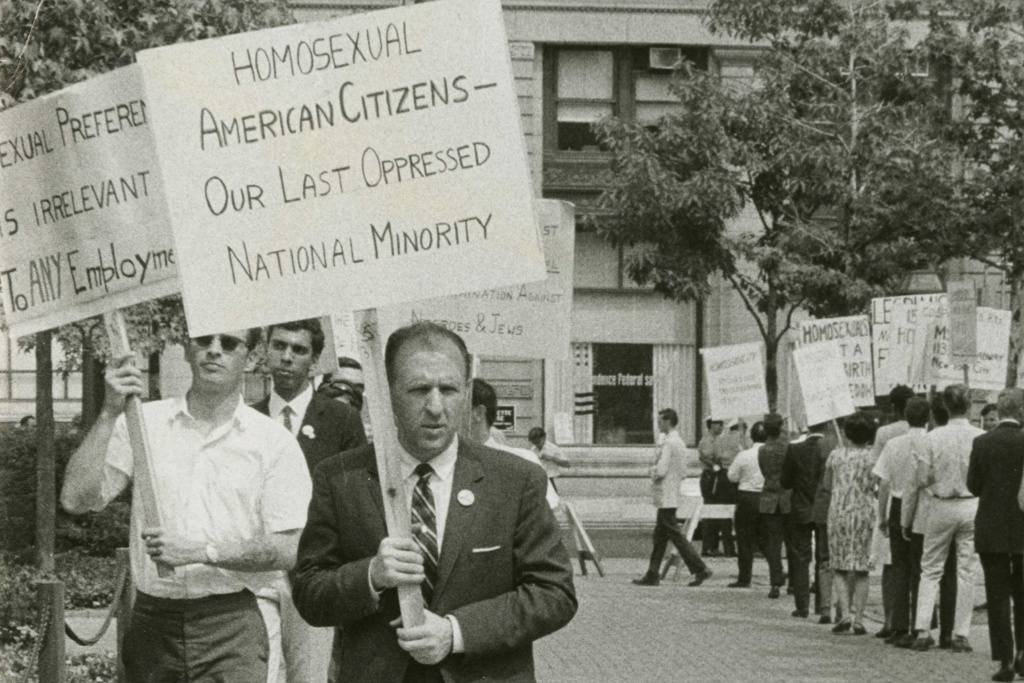Josh Howard’s compelling documentary, “The Lavender Scare,” adapted from David K. Johnson’s book, chronicles the federal government’s persecution of gays and lesbians during the Cold War.
The film, narrated by Glenn Close, mixes interviews, photographs, archival footage and film clips, as well as reenactments, to present a handful of case studies of men and women who were impacted by the 1953 Eisenhower law that allowed LGBT people to be fired from government jobs because they were deemed potential risks to national security.
As Howard’s film ably shows, there were no cases of any gay men or lesbians betraying their country. However, the law remained in effect until 1995, when President Clinton reversed it.
“The Lavender Scare” unfolds in three acts: setting the historical stage; showing the impact of the law in denying rights to American citizens; and the efforts of Frank Kameny, dubbed the “(Grand)father of the Gay Rights Movement,” to combat the injustice.
Howard features scenes of Kameny — voiced by out gay actor David Hyde Pierce — writing letters that establish his personal feelings and activist position. These moments are encouraging, but they are juxtaposed with stories of victims like Madeleine Tress — voiced by out actor Cynthia Nixon — who describe the demeaning interviews and the campaigns FBI agents and investigators waged to identify and remove gays and lesbians from their jobs.
Historical observations and commentaries in the film from interviewees such as John D’Emilio and Lillian Faderman provide context to these cases of men and women who were forced to live a double life. Many individuals were asked to inform on coworkers.
As the numbers of “victims” rose in Washington, D.C., the harassment trickled down to the local level as police raided gay bars and lesbian establishments, rounding up innocent LGBTs and publishing their names in the newspapers, effectively ending their careers and destroying their lives.
“The Lavender Scare” is quite chilling as it illustrates these horrifying moments in U.S. history. But Howard offers moments of optimism, such as the diary entry by a young man named Ladd Forrester, who moved to the nation’s capital for work and was tearfully joyous at the sight of men dancing together at a party. Likewise, when World War 2 broke out, many gay men and lesbians had the unexpected opportunity to socialize with each other.
One interviewee, Joan Cassidy, talks at length about her career in the military and how she had to keep her sexual orientation a secret. She expresses heartfelt regret at having had to turn down a chance at becoming an admiral for fear of being outed.
An even bigger tragedy is the case of Drew Ference, a young man who worked in the Foreign Service in Paris and had a “roommate” named Bob. Drew’s letters to his family, read by out actor T.R. Knight, are discussed in the film by his brother and niece, who remember him fondly. They recount their shock when Drew is disgraced and subsequently takes drastic action after he’s identified as a gay man.
Howard lets his subjects’ words display the negative effects of the law, which used the fear of communism to target homosexuals. For instance, Carl Rizzi, who served in the Navy and worked for the United States Postal Service, was harassed for being in a drag show and had his livelihood threatened.
Other men, the film shows, were given undesirable discharges from the military and asked to name five homosexuals when interrogated by authorities. These scenes generate righteous anger from viewers.
However, “The Lavender Scare” also presents the inspiring story of Kameny, who pushed back as the president and cofounder of the Washington branch of gay-activist organization Mattachine Society. Through extensive letter-writing campaigns as well as picketing, he forced the government to alter its discriminatory practices.
When Kameny takes the case of Jamie Shoemaker, a linguist at the National Security Agency targeted for being gay, he helps Shoemaker retain his security clearance and ushers in a new era of LGBT rights.
“The Lavender Scare” ends on a hopeful note as positive outcomes in several lives portrayed in the film are revealed.
Howard has presented a history of gay rights that predates Stonewall, which is also featured. It’s a history that deserves to be learned, especially at a time when the LGBTQ-plus population faces threats to its dignity and when livelihoods are still vulnerable.
“The Lavender Scare” will air on PBS June 18 at 9 p.m.

